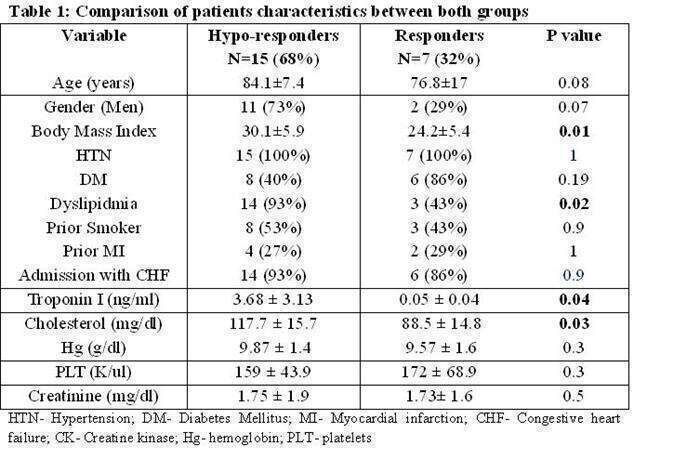Background: Dual anti-platelet therapy is an essential component of post- percutaneous coronary intervention (PCI) and transcatheter aortic valve replacement (TAVR) management. While several trials have studied the impact of hypo-responsiveness to clopidogrel [Platelet Reactivity Units (PRU) > 230] in PCI patients, data on the clopidgorel hypo-responsiveness post TAVR is lacking. The objectives of the study were to characterize predictors and outcomes of clopidogrel responders and hypo-responders patients using Accumetrics VerifyNow® (San Diego, CA) P2Y12 testing post TAVR.
Methods: Twenty two consecutive patients underwent TAVR and platelet function testing after initial background aspirin and 600 mg of clopidogrel. Post procedure a daily maintenance dose of 75 mg clopidogrel was administrated. Patients’ characteristics, presentation [heart failure, syncope, angina] and major adverse cardiac events (MACE) (death, acute myocardial infarction, major bleeding and re-admission) were compared between responders and hypo-responders.
Results: Of the 22 patients 15 (68%) were hypo-responders. Comparison between the two groups is presented in table 1.

MACE rate at 30 days was similar between responders and hypo-responders [2/7 (29%) vs. 3/15 (20%), respectively, p=0.9)].
Conclusions: Clopidogrel hypo-responsiveness post TAVR is a common phenomenon. These patients are characterized by higher BMI, dyslipidemia and a trend towards older age and male gender. MACE rate at 30 days was similar for responders and hypo-responders. Further studies are needed to investigate this high rate of hypo-responsiveness post TAVR and its potential consequences on clinical outcomes.

